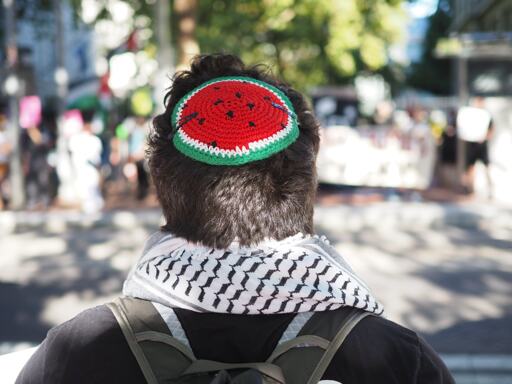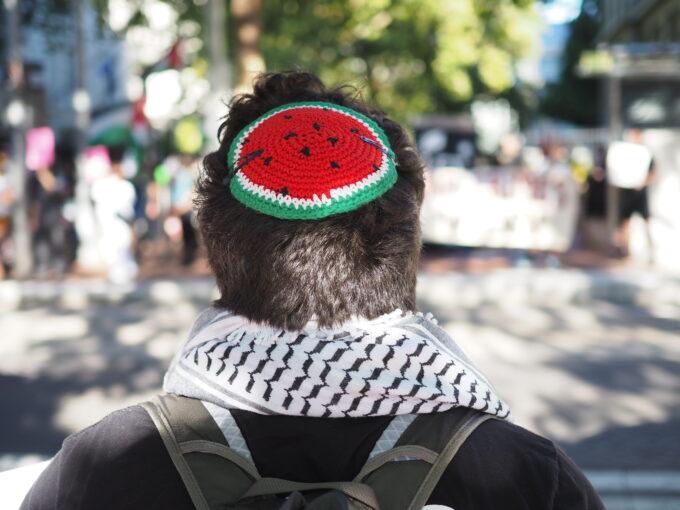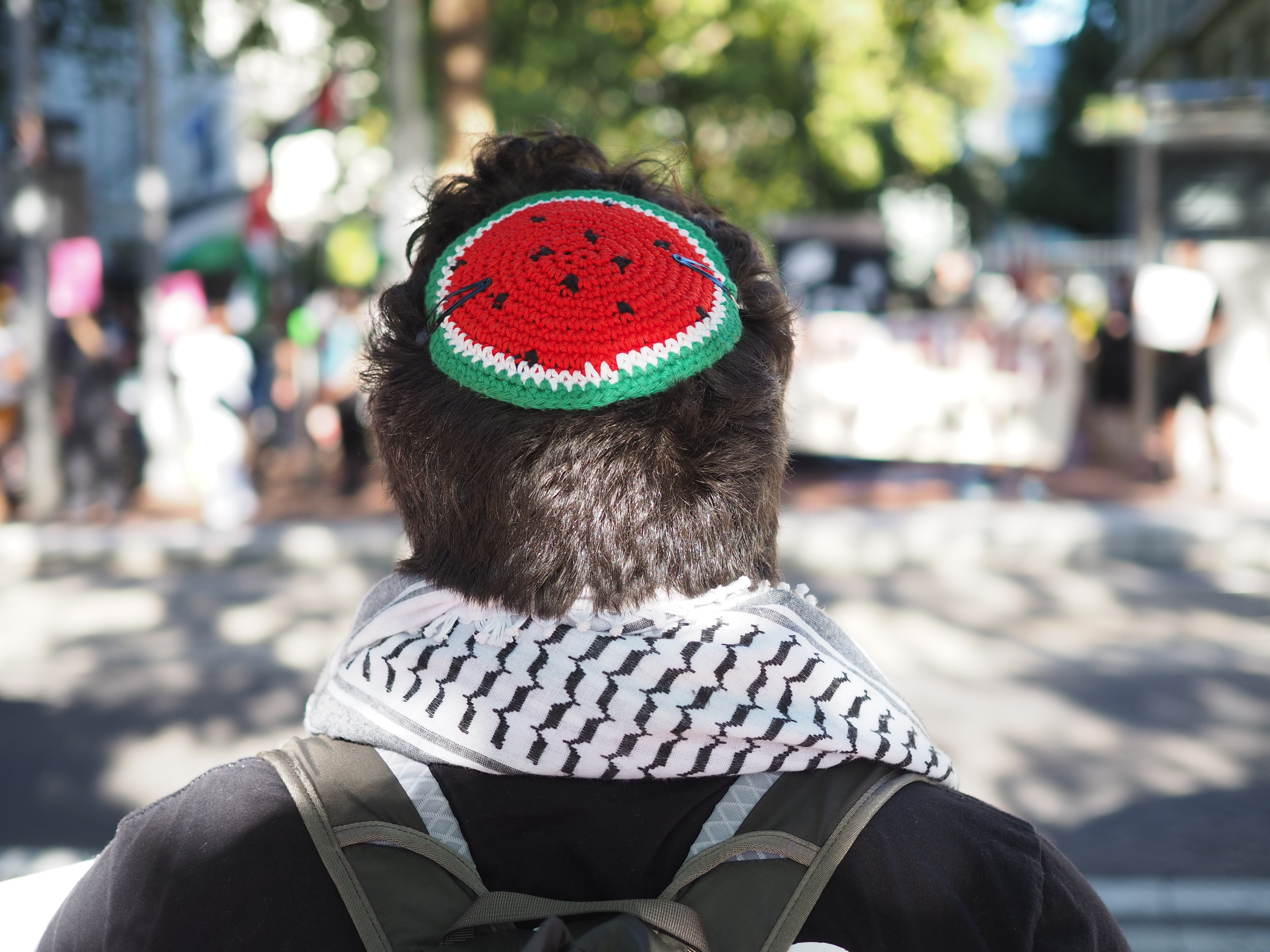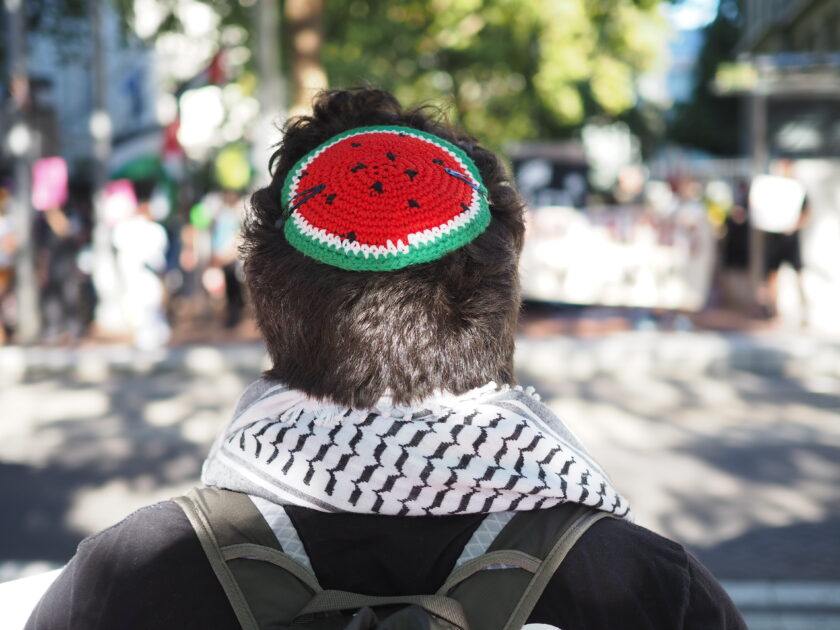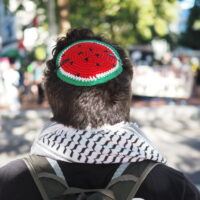Photograph by Nathaniel St. Clair
Many fellow Jews have accused me of stoking the fire of antisemitism and inciting anti-Jewish violence since I publicly joined the crescendoing chorus of genocide scholars, humanitarian organizations, politicians and prominent Israelis who use the word “genocide” to describe the actions of the Israeli government in response to the unimaginable Hamas terrorist attack of October 7th, 2023, and the ongoing hostage crisis. One commenter on a recent online post I made regarding the assault of a Jewish father in front of his children in Montreal wrote to me: “Every vilification of Israel, including Ha’aretz posts like yours, fuels antisemitism.”
It is easy to come to such a conclusion in the current zeitgeist. An antisemite recently defaced a historic synagogue not far from my home in nearby Victoria, BC, Canada. In a hateful and threatening act, that individual scrawled on a pillar of the historic congregation that “Jews are evil because genocide is evil,” implying that the genocidal actions of the Israeli government mean that all Jews are “child-killing…monsters.” Similarly, individuals commenting on my public social media posts of articles critical of the Israeli government from publications such as Haaretz, the Times of Israel, and the Guardian have utilized that critique as a springboard for spewing antisemitic canards about the inherently “evil” nature of Jews.
While such hateful messaging might understandably dissuade some well-meaning individuals from using “genocide” to describe the Israeli government’s policy in Gaza, refraining from doing so is far more dangerous for both the Palestinian children in the line of fire and starving in Gaza and the global Jewish community. Those of us who have concluded that the International Court of Justice (ICJ) will eventually confirm the formal accusation of genocide against the Israeli government are choosing to face the reality that it has perpetrated this “crime of crimes.” The sooner that the Jewish world acknowledges the veracity of this tragedy with open eyes, the less painful the fallout will be for Israel and Jews everywhere when that court officially pronounces that verdict. If the ICJ does not do so, I shall be among the first to admit my error publicly. If and when it will, I can only pray that it will help to expedite the process of restorative justice for the genocidal actions of both Hamas on October 7th and the government of Israel since that awful day. Only when that acknowledgement and process begin will there be a chance for lasting peace, as well as an end to Israel’s condemnation for perpetrating and then denying this atrocity, which plays directly into the hands of antisemites.
T’ruah: The Rabbinic Call for Human Rights has published an essential guide entitled “Criticism of Israel and Antisemitism: How to tell Where one ends and the Other Begins.” There, Truah director Rabbi Jill Jacobs writes: “As protests against the war have erupted, so has significant confusion — sometimes deliberate and sometimes not — about the boundaries between criticism of Israel and antisemitism. This may be understandable given Israel’s standing as the only Jewish country in the world, which can lead to conflation between Israel as a country and Jews as a people. Add to the mix the persistence of antisemitism over more than two millennia, and the confusion becomes even less surprising.” The same logic applies to those with antisemitic intentions who usurp the term “genocide” for their nefarious ends.
To be sure, this can be a tough line to walk. Without knowing my views on the ethnic cleansing and retributive genocide in Gaza, an acquaintance in the Jewish community recently asked me for my thoughts on risingantisemitism. This fellow parent posed this question to me just as my children and I left a farewell gathering at a public splash park for our preschooler’s friend, who was about to move to Israel. I responded by stating how truly awful it was to see and endure this hatred. The parent then indicated how he blamed the younger generation’s “false narrative” about Israel’s policy in Gaza for inciting anti-Jewish rhetoric. I considered how best to reply and decided – for better or worse – that this was not the place for me to begin a debate over this issue. All I could muster to say in response was a pithy “I pray for peace.” Was this a missed opportunity to open someone’s mind to another viewpoint? More than likely, yes. Given the charged, unpredictable tensions surrounding this issue, and fearing unhelpful escalation in front of the children and families at the party and the park, I decided not to engage in debate at that fraught moment. The prospect of facing yet another painful iteration of the various forms of backlash and invective that fellow Jews have hurled at me for my views – even as a progressive Zionist – proved too much to bear. Perhaps writing about that experience here is a form of expiation for my residual guilt over backing down from the chance to engage with an opposing viewpoint respectfully.
History has proven antisemitism to be an insidious disease that continues to plague humanity, requiring steadfast vigilance. Yet, when the victims of anti-Jewish attacks invoke that reality as a reason to refuse to acknowledge the genocidal actions of the Israeli government, they only further cede power to those forces that would try to destroy Judaism and dismantle Israel, whose existence seems more necessary now than ever to provide a safe harbour for Jews across the world. Fanning the flames of hatred by denying the actions of that government is a recipe for disaster for the Jewish people. Ceasefire, acknowledgement of wrongs, teshuvah (repentance) on both sides of this conflict for genocidal actions, reconciliation, and restorative justice are the only viable paths forward to bringing the hostages home and putting an end to the cycle of violence and killings.
The post Confronting the Realities of Antisemitism and the Gaza Genocide appeared first on CounterPunch.org.
From CounterPunch.org via this RSS feed


